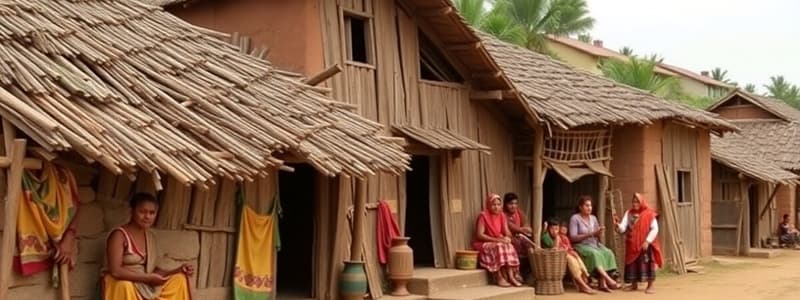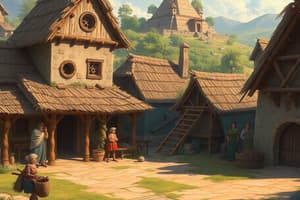Podcast
Questions and Answers
In the early years of surplus, villages were complex due to a large population and many specialized jobs.
In the early years of surplus, villages were complex due to a large population and many specialized jobs.
False (B)
What led to the growth of communities and villages?
What led to the growth of communities and villages?
- The formation of social classes
- Increased trade due to extra food and supplies (correct)
- The specialization of skills
- The development of government
What is a social class?
What is a social class?
A group of people sharing similar skills, background, income, and customs.
A person trained in a skill, like a potter or weaver, is called an ______.
A person trained in a skill, like a potter or weaver, is called an ______.
Which of the following was NOT a factor in the development of social classes in early villages?
Which of the following was NOT a factor in the development of social classes in early villages?
Match the following terms with their definitions:
Match the following terms with their definitions:
What was the first form of government in villages?
What was the first form of government in villages?
As villages grew, the need for leaders to manage the community became less important.
As villages grew, the need for leaders to manage the community became less important.
The development of ______ in early villages led to the formation of different social classes.
The development of ______ in early villages led to the formation of different social classes.
Flashcards
Surplus
Surplus
Extra food and supplies that exceeded needs.
Village
Village
A small community where people live and trade.
Artesian
Artesian
A skilled worker trained in a specific craft.
Social Class
Social Class
Signup and view all the flashcards
Trade
Trade
Signup and view all the flashcards
Leadership
Leadership
Signup and view all the flashcards
Government
Government
Signup and view all the flashcards
Artisan Skills
Artisan Skills
Signup and view all the flashcards
Population Growth
Population Growth
Signup and view all the flashcards
Study Notes
Simple Villages to Complex Villages
- Extra food and supplies led to trade among people, marking the start of communities and villages.
- Early villages were simple due to small populations and limited specialized work
- As time passed, populations grew, leading to specialization of skills.
- People became craftsmen (potters, weavers) and were trained in various skills including carpentry, pottery, and clothmaking.
- Individuals skilled in craftwork (artisans) were respected
- Social classes developed based on similarities in skills, background, income and customs.
- Skilled artisans (potters, cloth makers) belonged to a high social class.
- Untrained individuals were considered of a lower social class and treated less well.
- Highly respected leaders emerged to maintain order and settle disputes in expanding villages.
- Leaders enforced laws, leading to a safer and more stable community, this was the first form of organized government.
Studying That Suits You
Use AI to generate personalized quizzes and flashcards to suit your learning preferences.




